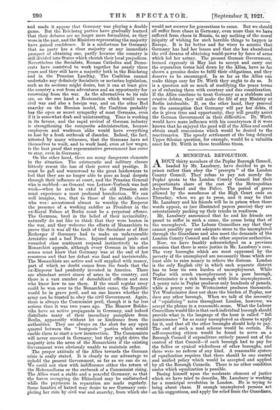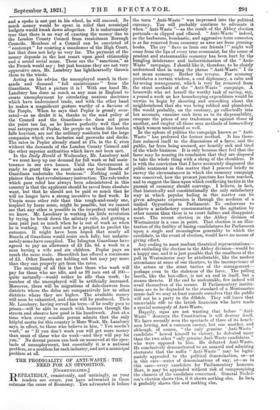A MUNICIPAL REVOLUTION.
ABOUT thirty members of the Poplar Borough Council, headed by Mr. Lansbury, have decided to go to prison rather than obey the " precepts " of the London County Council. They refuse to pay not merely the Poplar quota to the London County Council but their proportionate share of the cost of the Metropolitan Asylums Board and the Police. The period of grace allowed by the mandamus of the High Court ends on Thursday, when we go to press, and it may be that Mr. Lansbury and his friends will be in prison when these words appear, as (see illustrated papers passim) they are ostentatiously packing -up their trunks in readiness. Mr. Lansbury announced that he and his friends are proud to suffer in such a cause, the cause being that of the unemployed. The Labour Councillors say that they cannot possibly pay out adequate sums to the unemployed through the Guardians and also meet the demands of -the London County Council and the other- superior authorities. Now, we have frankly acknowledged on a previous occasion that there is some justice in Mr. Lansbury's case. The very boroughs 'which are most oppressed by the poverty of the unemployed are necessarily those which are least able to raise money to relieve the distress. London is the only English city in which each separate district has to bear its own burden of unemployment. While Poplar with much unemployment is a poor borough,. Westminster is a- rich borough with little- unemployment. A penny rate in- Poplar produces only hundreds of pounds, while a penny rate in Westminster produces thousands. Yet Westminster does not share the burden of Poplar, nor does any other borough. When we talk of the necessity of " equalizing " rates throughout London, however, we accept the phrase in a reasonable sense. What the Labour Councillors would like is that each individual borough should provide what 'in the language of the hour is called " full maintenance" for as many unemployed as choose to-apply for it, and that all 'the other boroughs should help to pay. The end of such a mad scheme would be certain. No self-respecting citizen would be found to serve on a Borough Council if expenditure entirely passed out of the control of that Council—if each borough had to pay for the follies or cynical wickedness of other boroughs, and there were no redress of any kind. A reasonable system of equalization requires that there should be one central and unified policy which would be accepted and applied by all the Borough Councils. There is no other condition under which equalization is possible. Basing himself upon the moderate element of justice which we have tried to describe, Mr. Lansbury is. working for • a municipal revolution in London. He is trying to bring about chaos. If enough unemployed persons act on -his suggestions, and, apply forrelief from the Guardians, and a spoke is not put in his wheel, he will succeed. _So much money would be spent in relief that municipal budgets would break down altogether. It is unfortunately true that there is no way of exacting the money due to the London County Council from recalcitrant Borough Councils. Members of a Council can be convicted of " contempt " for resisting a mandamus of the High Court, but that does not help us very far. The payment of the money depends in the, last resort upon good citizenship and a sound social sense. These are the " sanctions," as the French would say ; but just because they are not very oppressive ones, Mr. Lansbury has lightheartedly thrown them to the winds.
Acting on his advice the unemployed march in thou- sands and demand " full maintenance " from the Guardians. What a picture it is ! With one hand Mr. Lansbury has done as.-- much as any man in England to create unemployment by circulating noxious doctrines which have undermined trade, and with the other hand he makes -a magnificent gesture worthy of a Saviour of the People. When he says that Poplar is grossly over- rated—as no doubt it is, thanks to the mad policy of the Council and the Guardians—he does not press the point too far, as he knows perfectly well that the real ratepayers of Poplar, the people on whom the burden falls heaviest, are not the ordinary residents but the large companies which own factories and gasworks and docks. The rates in Poplar already stand at 27s. in the £, even without the demands of the Landon County Council and the other superior authorities which have not been met.
In the Daily Herald of ,Wednesday, Mr. Lansbury said " we must -keep up our demand for full work or full main- tenance in our own homes. Until the Government is ready to grant this we must make our local Boards of Guardians undertake the business." Nothing could. be plainer than that revolutionary instruction. The rule under which poor relief has always been administered in this country is that the applicant should be saved from absolute want, but that he should not be paid so much that he will no longer have a strong incentive to find. work. In Utopia some other rule than this rough-and-ready one, inspired by horse sense, might be possible, but we cannot see that any other is possible in the imperfect world that we know. Mr. Lansbury is working his little revolution by trying to break down the salutary rule, and getting a man paid just as much when he is out of work as when he is working. One need not be a prophet to predict the outcome. It might have been hoped that nearly all Boards of Guardians would,resist such folly, but unfortu- nately some have complied. The Islington Guardians have agreed to pay an allowance of £3 13s. 6d. a week to a man having a wife and six children. Poplar pays on much the same scale. Shoreditch has offered a maximum of £3. Other Boards are holding out but may pay more than they can properly get from the rates. The meaning of all this is that those who work will pay for those who are idle, and as 99 men out of 100— quite naturally—would rather be idle than work, i he number of the unemployed will be artificially increased, Moreover, there will be migrations of dole-drawers from districts where the doles are comparatively low to other districts where they are higher. The available money will soon be exhausted, and chaos will be produced. Then Mr. Lansbury, having served his term—if he really goes to prison—will lae able to march with banners through the streets and observe how good is his handiwork. Just at a time when every sensible person admits that the only helpful motto for this country is More Work, Mr. Lansbury says, in effect, to those who believe in him, " You needn't work," or " If you don't work you will get more money than most of those who do work—and they will pay for you." No decent person can look on unmoved at the spec- tacle of unemployment, but essentially it is a national problem, or a problem for each industry, and not a municipal problem at all.



































 Previous page
Previous page